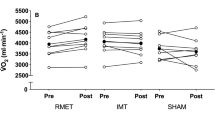Abstract
The respiratory muscles have a key role within the respiratory system allowing air to be pumped in and out the lungs. As other skeletal muscles, they can fatigue and be affected by pathological mechanisms leading to muscle weakness. They can also be trained using specific strategies inducing overloading and adaptations over time. Inspiratory muscle resistive training and respiratory muscle isocapnic hyperpnea training are the two main training methods used to increase respiratory muscle strength and endurance. It has been shown in healthy subjects that these kinds of training improve not only respiratory muscle function but also endurance exercise performance. In several diseases, patients can also benefit from respiratory muscle training which can improve respiratory function, exercise capacities, symptoms, and quality of life. As other training and rehabilitative methods, also respiratory muscle training, to be efficient, requires appropriate modalities, intensity, and duration as well as evaluations of the training effects.
Access this chapter
Tax calculation will be finalised at checkout
Purchases are for personal use only
Similar content being viewed by others
References
ATS/ERS. ATS/ERS statement on respiratory muscle testing. Am J Respir Crit Care Med. 2002;166(4):518–624.
Johnson BD, Babcock MA, Suman OE, Dempsey JA. Exercise-induced diaphragmatic fatigue in healthy humans. J Physiol. 1993;460:385–405.
Taylor BJ, How SC, Romer LM. Exercise-induced abdominal muscle fatigue in healthy humans. J Appl Physiol. 2006;100(5):1554–62.
Verges S, Notter D, Spengler CM. Influence of diaphragm and rib cage muscle fatigue on breathing during endurance exercise. Respir Physiol Neurobiol. 2006;154(3):431–42.
Verges S, Schulz C, Perret C, Spengler CM. Impaired abdominal muscle contractility after high-intensity exhaustive exercise assessed by magnetic stimulation. Muscle Nerve. 2006;34(4):423–30.
Suzuki S, Yoshiike Y, Suzuki M, Akahori T, Hasegawa A, Okubo T. Inspiratory muscle training and respiratory sensation during treadmill exercise. Chest. 1993;104(1):197–202.
Verges S, Boutellier U, Spengler CM. Effect of respiratory muscle endurance training on respiratory sensations, respiratory control and exercise performance: a 15-year experience. Respir Physiol Neurobiol. 2008;161(1):16–22.
Illi SK, Held U, Frank I, Spengler CM. Effect of respiratory muscle training on exercise performance in healthy individuals: a systematic review and meta-analysis. Sports Med. 2012;42(8):707–24.
Romer LM, McConnell AK, Jones DA. Inspiratory muscle fatigue in trained cyclists: effects of inspiratory muscle training. Med Sci Sports Exerc. 2002;34(5):785–92.
Verges S, Lenherr O, Haner AC, Schulz C, Spengler CM. Increased fatigue resistance of respiratory muscles during exercise after respiratory muscle endurance training. Am J Physiol Regul Integr Comp Physiol. 2007;292(3):R1246–53.
McConnell AK, Sharpe GR. The effect of inspiratory muscle training upon maximum lactate steady-state and blood lactate concentration. Eur J Appl Physiol. 2005;94(3):277–84.
Spengler CM, Roos M, Laube SM, Boutellier U. Decreased exercise blood lactate concentrations after respiratory endurance training in humans. Eur J Appl Physiol Occup Physiol. 1999;79(4):299–305.
Ferreira G, Costa A, Plentz R, Coronel C, Sbruzzi G. Respiratory training improved ventilatory function and respiratory muscle strength in patients with multiple sclerosis and lateral amyotrophic sclerosis: systematic review and meta-analysis. Physiotherapy. 2016;102(3):221–8.
Berlowitz D, Tamplin J. Respiratory muscle training for cervical spinal cord injury. Cochrane Database Syst Rev. 2013;23(7):CD008507.
Beaumont M, Forget P, Couturaud F, Reychler G. Effects of inspiratory muscle training in COPD patients: a systematic review and meta-analysis. Clin Respir J. 2018;12:2178.
Gosselink R, De Vos J, van den Heuvel SP, Segers J, Decramer M, Kwakkel G. Impact of inspiratory muscle training in patients with COPD: what is the evidence? Eur Respir J. 2011;37(2):416–25.
Freitas D, Holloway E, Bruno S, Chaves G, Fregonezi G, Mendonça K. Breathing exercises for adults with asthma. Cochrane Database Syst Rev. 2013;1(10):CD001277.
Houston BW, Mills N, Solis-Moya A. Inspiratory muscle training for cystic fibrosis. Cochrane Database Syst Rev. 2013;21(11):CD006112.
Neto M, Martinez B, Conceiçao C, Carvalho V. Combined exercise and inspiratory muscle training in patients with heart failure: a SYSTEMATIC REVIEW AND META-ANALYSIS. J Cardiopulm Rehabil Prev. 2016;36(6):395–401.
Villiot-Danger J, Villiot-Danger E, Borel J, Pépin J, Wuyam B, Verges S. Respiratory muscle endurance training in obese patients. Int J Obes. 2011;35(5):692–9.
Vivodtzev I, Tamisier R, Croteau M, Borel J, Grangier A, Wuyam B, et al. Ventilatory support or respiratory muscle training as adjuncts to exercise in obese CPAP-treated patients with obstructive sleep apnoea: a randomised controlled trial. Thorax. 2018;73:634.
Martin-Valero R, De La Casa Almeida M, Casuso-Holgado M, Heredia-Madrazo A. Systematic review of inspiratory muscle training after cerebrovascular accident. Respir Care. 2015;60(11):1652–9.
Menezes K, Nascimento L, Ada L, Polese J, Avelino P, Teixeira-Salmena L. Respiratory muscle training increases respiratory muscle strength and reduces respiratory complications after stroke: a systematic review. J Physiother. 2016;62(3):138–44.
Bissett B, Leditschke I, Paratz J, Boots R. Respiratory dysfunction in ventilated patients: can inspiratory muscle training help? Anaesth Intensive Care. 2012;40(2):236–46.
Katsura M, Kuriyama A, Takeshima T, Fukuhara S, Furukawa T. Preoperative inspiratory muscle training for postoperative pulmonary complications in adults undergoing cardiac and major abdominal surgery. Cochrane Database Syst Rev. 2015;5(10):CD010356.
Mans C, Reeve J, Elkins M. Postoperative outcomes following preoperative inspiratory muscle training in patients undergoing cardiothoracic or upper abdominal surgery: a systematic review and meta analysis. Clin Rehabil. 2015;29(5):426–38.
Laciuga H, Rosenbek J, Davenport P, Sapienza C. Functional outcomes associated with expiratory muscle strength training: narrative review. J Rehabil Res Dev. 2014;51(4):535–46.
Author information
Authors and Affiliations
Corresponding author
Editor information
Editors and Affiliations
Rights and permissions
Copyright information
© 2019 Springer Nature Switzerland AG
About this chapter
Cite this chapter
Verges, S. (2019). Respiratory Muscle Training. In: Cogo, A., Bonini, M., Onorati, P. (eds) Exercise and Sports Pulmonology. Springer, Cham. https://doi.org/10.1007/978-3-030-05258-4_10
Download citation
DOI: https://doi.org/10.1007/978-3-030-05258-4_10
Published:
Publisher Name: Springer, Cham
Print ISBN: 978-3-030-05257-7
Online ISBN: 978-3-030-05258-4
eBook Packages: MedicineMedicine (R0)




